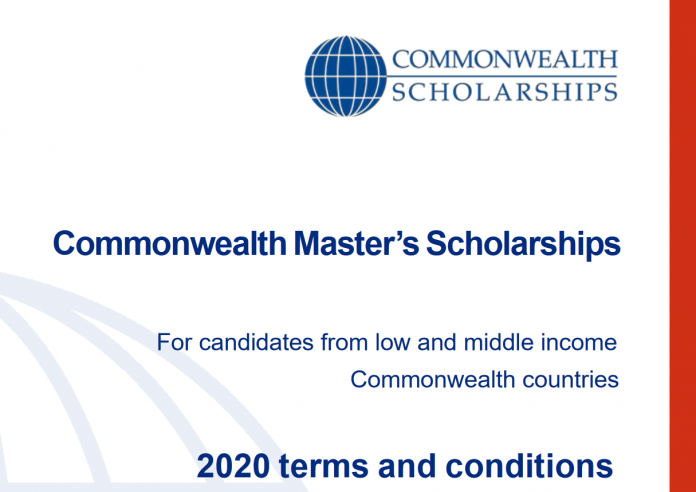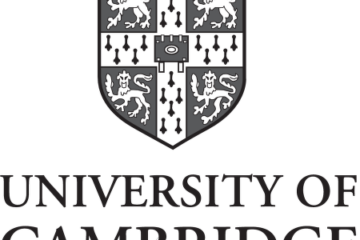Commonwealth Master’s Scholarships 2020 for full-time Master’s study at a UK university (Fully Funded)

Commonwealth Master’s Scholarships are for candidates from low and middle income Commonwealth countries, to undertake full-time taught Master’s study at a UK university.
Funded by the UK Department for International Development (DFID), Commonwealth Master’s Scholarships enable talented and motivated individuals to gain the knowledge and skills required for sustainable development, and are aimed at those who could not otherwise afford to study in the UK. These scholarships are offered under six themes:
- Science and technology for development
- Strengthening health systems and capacity
- Promoting global prosperity
- Strengthening global peace, security and governance
- Strengthening resilience and response to crises
- Access, inclusion and opportunity
Eligibility
To apply for these scholarships, you must:
- Be a citizen of or have been granted refugee status by an eligible Commonwealth country, or be a British Protected Person
- Be permanently resident in an eligible Commonwealth country
- Be available to start your academic studies in the UK by the start of the UK academic year in September/October 2020
- By September 2020, hold a first degree of at least upper second class (2:1) honours standard, or a second class degree (2:2) and a relevant postgraduate qualification (usually a Master’s degree). The CSC would not normally fund a second UK Master’s degree. If you are applying for a second UK Master’s degree, you will need to provide justification as to why you wish to undertake this study
- Be unable to afford to study in the UK without this scholarship
- Have provided all supporting documentation in the required format
You may also check:
- Apply for Chevron Nigeria 2020 January – June Internship Placement for young Nigerians
- Columbia University Earth Institute 2019/2020 Postdoctoral Fellowship Research program in Sustainable Development (Funded)
- Digital Rights and Inclusion Forum 2020: Call for applications
Scholarship Worth:
Each scholarship provides:
- Approved airfare from your home country to the UK and return at the end of your award (the CSC will not reimburse the cost of fares for dependants, nor the cost of journeys made before your award is confirmed)
- Approved tuition fees Stipend (living allowance) at the rate o £1,110 per month, or £1,362 per month for those at universities in the London metropolitan area (rates quoted at 2019-2020 levels)
- Warm clothing allowance, where applicable Thesis grant towards the cost of preparing a thesis or dissertation, where applicable
- Study travel grant towards the cost of study-related travel within the UK or overseas If you are widowed, divorced, or a single parent, child allowance of £476 per month for the first child, and £117 per month for the second and third child under the age of 16, if you are accompanied by your children and they are living with you at the same address in the UK (rates quoted at 2019-2020 levels)
Eligible Commonwealth countries
Antigua and Barbuda
Bangladesh
Belize
Botswana
Cameroon
Dominica
Eswatini
Fiji
The Gambia
Ghana
Grenada
Guyana
India
Jamaica
Kenya
Kiribati
Lesotho
Malawi
Malaysia
Mauritius
Montserrat
Mozambique
Namibia
Nauru
Nigeria
Pakistan
Papua New Guinea
Rwanda
Samoa
Sierra Leone
Solomon Islands
South Africa
Sri Lanka
St Helena
St Lucia
St Vincent and the Grenadines
Tanzania
Tonga
Tuvalu
Uganda
Vanuatu
Zambia
Selection process
Each year, the CSC invites selected nominating bodies to submit a specific number of nominations. The deadline for nominating bodies to submit nominations to the CSC is 18 December 2019
The CSC invites around three times more nominations than scholarships available – therefore, nominated candidates are not guaranteed to be awarded a scholarship. There are no quotas for scholarships for any individual country. Candidates nominated by national nominating agencies are in competition with those nominated by other nominating bodies, and the same standards will be applied to applications made through either channel.
Applications will be considered according to the following selection criteria:
- Academic merit of the candidate
- Quality of the plan of study
- Potential impact on the development of the candidate’s home country
How to apply
You must apply to one of the following nominating bodies in the first instance – the CSC does not accept direct applications for these scholarships:
- National nominating agencies – this is the main route of application
- Selected non-governmental organisations and charitable bodies
All applications must be made through one of these nominating bodies. Each nominating body is responsible for its own selection process and may have additional eligibility criteria. You must check with your nominating body for their specific advice and rules for applying, their own eligibility criteria, and their own closing date for applications.
You must make your application using the CSC’s online application system, in addition to any other application that you are required to complete by your nominating body. The CSC will not accept any applications that are not submitted via the online application system.
All applications must be submitted by 16:00 (GMT) on 30 October 2019 at the latest.
You can access the online application system now
Please note that the CSC does not charge candidates to apply for any of its scholarships or fellowships through its online application system, and it does not charge organisations to nominate candidates.
Choosing a university/course
You may find the following resources useful when researching your choices of institution and course of study in the UK:
- Study UK – British Council website, with guidance for international students and a course and institution search
- Steps to Postgraduate Study – a guide to asking the right questions about taught postgraduate study in the UK
- Postgrad.com – information for postgraduate students, with a course search
- Prospects – information on postgraduate study in the UK
- Research Excellent Framework 2014 results – results of a system for assessing the quality of research in UK higher education institutions
- UCAS Postgraduate – guidance on how to find and apply for a postgraduate course
- Unistats – the official website for comparing UK higher education course data
- UKCISA (UK Council for International Student Affairs) – advice for international students on choosing a course of study
The CSC is not responsible for the content of external sites.
CLICK HERE TO APPLY
You may also check:














